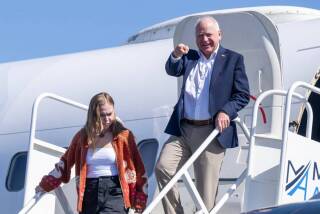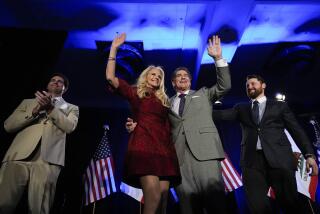Governor OKs Early Primary for 2000
- Share via
SACRAMENTO — Gov. Pete Wilson played havoc with the 2000 presidential race Monday--and perhaps boosted his own aspirations--by signing legislation that will jam California’s next primary into the already crowded start of the election season.
The action, which involves all of the state’s primary voting, is intended to lure attention and clout to the state, and means voters will head to the polls March 7, 2000--the earliest date allowed for presidential voting under political party rules.
That schedule still leaves the traditional Iowa caucus and New Hampshire primary at the head of the presidential campaign schedule--as party rules demand. But it adds significantly to a growing bottleneck in March because at least five other states--including New York--have claimed the same date and more are expected to follow soon.
Some analysts suggest that the national game of political leapfrog could leave more than half of the states and three quarters of the U.S. population voting within eight days in March.
Critics worry that the states are essentially moving toward a national nomination day, compromising the democratic benefits of a more deliberative primary process. They also fear that the only candidates who could survive such a rigorous schedule are those already well known, very rich or both.
Massachusetts Secretary of State William Galvin said Monday that California’s move was a “disaster for the traditional presidential primary process as we’ve known it.”
Wilson, who is considering a White House bid in 2000 that might benefit from the new schedule, disputed such criticism at a bill-signing ceremony Monday where he was surrounded by American flags and about 100 school children on the steps of the state Capitol.
He said his action is needed to correct the irrelevant role left to California when party nominations are already determined by states that vote earlier.
“California voters are finally going to have some clout in deciding who it is that the major parties nominate for president,” Wilson declared. “That is only fair. It is not reasonable that the nation’s most dynamic, diverse and distinctive state . . . has virtually no say in nominating candidates for the highest office in the land.”
California--loaded with almost 10% of the national delegates for both parties--had similar hopes in the last presidential contest. Then, lawmakers moved the primary voting from its traditional date in early June to March 26.
But it was all for naught, because the national electoral system had already grown so front-loaded that Republican Bob Dole sealed the nomination before the campaign arrived in the West.
This time, California lawmakers were taking no chances. They moved the primary to the first date under which the Democratic party allows delegates to be selected for its national convention. Unlike the Democrats, Republican Party rules allow states to vote as early as Feb. 7.
California’s move had broad bipartisan support in Sacramento. Fresno Democratic state Sen. Jim Costa was the bill’s author, and the measure comfortably passed both chambers of the Democrat-controlled Legislature.
The legislation, SB 1999, moves not just the presidential contest but also legislative, congressional and statewide initiative contests. The legislation schedules all future statewide primaries for the first Tuesday in March.
Presidential Race in 2000
Still, there was wide speculation that Wilson’s interest was partisan and personal.
Strategists suggest that the governor, who scuttled a previous presidential bid after six months of campaigning in 1995, could get a significant boost by an early California primary.
Wilson, who will leave office in January with polls showing the highest job rating of his eight-year tenure even while two-thirds discourage another presidential bid, declined to take questions at his news conference Monday. When distant reporters shouted queries about his intentions anyway, the governor cupped his ear, listened and just smiled.
Later, Wilson spokesman Sean Walsh said the governor “has not made up his mind” about whether to enter the presidential race in 2000. He also said Wilson left personal feelings aside when considering whether to sign the primary bill.
But political analysts say that although other candidates are stretched by running simultaneously in New York and California, Wilson could focus on the East.
“Certainly he thinks he’d be a very good president and he would like to be president,” said George Gorton, the lead consultant during Wilson’s 1995 presidential campaign. “I think the question in his mind has always been what his chances would be and I think this dramatically improves his chances.”
Nationwide, however, experts are not so sure how the gantlet of presidential primaries will affect the campaign and the candidates.
Will it make the New Hampshire and Iowa tallies more important by giving momentum to winning candidates as they head into later states? Or would they be diminished if candidates downplayed the small states and focused on the larger ones?
“I honestly think nobody can really tell right now,” said Tony Wyche, spokesman for the Democratic National Committee.
California’s Clout, Diversity
Wilson aides disputed the argument that little-known candidates might be excluded by the new schedule. Walsh suggested the opposite--that more candidates might be drawn to a race in which issues are broadened by California’s diverse population and economy.
“You are now going to have to appeal to a nation-state and . . . to run more true to what you would run on a national basis,” Walsh said. “This is the sound of the 800-pound gorilla waking up.”
California Secretary of State Bill Jones, who attended the signing ceremony, said it is appropriate for Iowa and New Hampshire to lead off the presidential voting schedule so lesser-known candidates have a viable forum.
Jones also acknowledged that California’s action has ruffled feathers among some of his counterparts nationally. Jones responded bluntly that “the fact is, my goal is to enfranchise the people of California.”
But he also said he hopes the seemingly inevitable problems of the compressed 2000 schedule will create a national incentive for states to negotiate a more equitable process for the 2004 presidential contest.
Jones and other election chiefs support a plan in which the Iowa caucus and New Hampshire primary would be followed by a series of four regional election days. The plan calls for the schedule of regional primaries to rotate between the four areas each election, providing every portion of the country with the lead position once every 20 years.
“What will happen is that out of this process will come some serious consideration of our proposal for 2004,” Jones said.
(BEGIN TEXT OF INFOBOX / INFOGRAPHIC)
Primary Numbers
Gov. Wilson signed legislation Monday to move California’s 2000 presidential primary date back to March 7--the earliest date allowed by national party rules. Here are the 2000 primary and caucus dates that have been set so far by other states.
*--*
Tentative 2000 1996 Primary Date State Method Primary March 7 California Primary March 26 Connecticut Primary March 5 Maryland Primary March 5 Massachusetts Primary March 5 New York Primary March 7 March 14 Florida Primary March 12 Oklahoma Primary March 12 Oregon Primary March 12 Tennessee Primary March 12 Texas GOP Primary March 12 March 15 Ohio Primary March 19 March 21 Michigan GOP Primary March 19 April 4 Wisconsin Primary March 19 April 4 Kansas GOP Primary April 2 April 25 Pennsylvania Primary April 23 May 2 Indiana Primary May 7 May 7 North Carolina Primary May 7 May 9 West Virginia Primary May 14 May 23 Arkansas Primary May 21 May 23 Idaho GOP Primary May 28 June 6 Alabama Primary June 4 New Jersey Primary June 4 New Mexico Primary June 4 South Dakota GOP Primary Feb. 27
*--*
Note: Some states hold separate tallies for the Republican and Democratic parties.
Source: California Secretary of State; Survey, National Association of Secretaries of State
More to Read
Get the L.A. Times Politics newsletter
Deeply reported insights into legislation, politics and policy from Sacramento, Washington and beyond. In your inbox twice per week.
You may occasionally receive promotional content from the Los Angeles Times.









